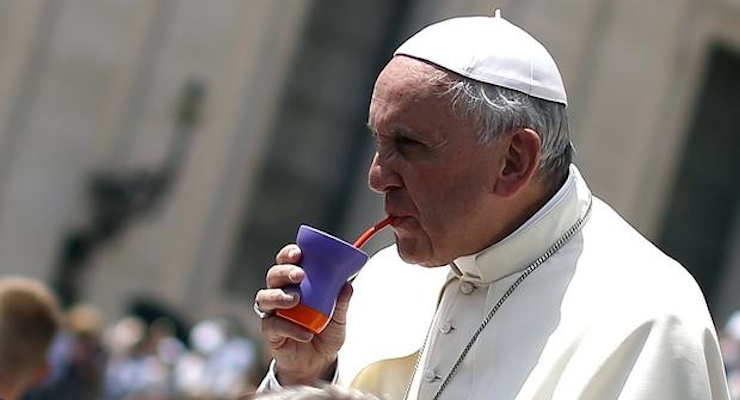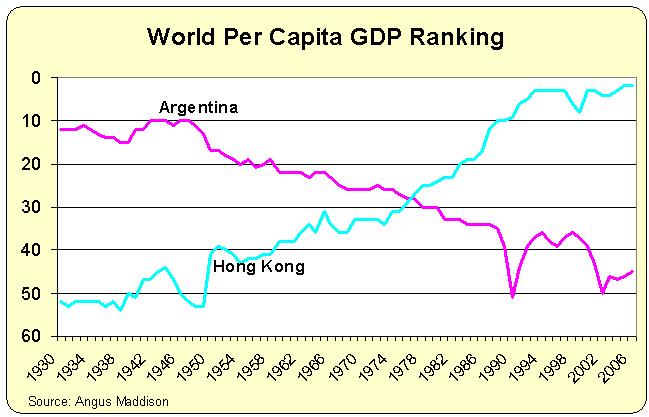

Pope Francis drinks mate, an Argentinian drink, during his weekly general audience at St. Peter’s Square at the Vatican, June 18, 2014. (Photo: AP)
Two days ago, I contrasted the views of Pope Francis and Walter Williams about capitalism and morality. I explained that Walter had the upper hand because free markets are a positive-sum game based on voluntary exchange while redistribution (at best) is a zero-sum game based on coercion.
That’s the theoretical argument. Now let’s look at the empirical data, specifically focusing on which approach is best for the less fortunate. Thomas Sowell, the great economist at Stanford University’s Hoover Institution, is not impressed by the Pope’s analysis. Here some of what Prof. Sowell wrote this week for People’s Pundit Daily.
Pope Francis has created political controversy…by blaming capitalism for many of the problems of the poor. …putting aside religious or philosophical questions, we have more than two centuries of historical evidence… Any serious look at the history of human beings over the millennia shows that the species began in poverty. It is not poverty, but prosperity, that needs explaining. …which has a better track record of helping the less fortunate — fighting for a bigger slice of the economic pie, or producing a bigger pie? …the official poverty level in the U.S. is the upper middle class in Mexico. The much criticized market economy of the U.S. has done far more for the poor than the ideology of the left. Pope Francis’ own native Argentina was once among the leading economies of the world, before it was ruined by the kind of ideological notions he is now promoting around the world.
I briefly discussed the failure of the Peronist Argentinian model last month, but let’s take a closer look at Professor Sowell’s assertions about the U.S. and Argentina. My colleague at the Cato Institute, Marian Tupy, has put together a great fact-filled website called Human Progress, and it allows users to access all sorts of databases to produce their own charts and tables.
And here’s what the data shows about per-capita economic output in Argentina and the United States.
Not exactly a ringing endorsement of the supposedly more compassionate system in Argentina.
As you can see from this table, Argentina actually was slightly richer than the U.S. back in 1896. But that nation’s shift to statism, particularly after World War II, hindered Argentina’s growth rates.
And seemingly modest differences in growth, compounded over decades, have a huge impact on living standards for ordinary people (i.e., inflation-adjusted GDP per person climbing nearly $27,000 in the U.S. vs an increase of less than $6,700 in Argentina).
By the way, this is not an endorsement of America’s economic policy. We have far too much statism in the United States.
But compared to Argentina, which generally has ranked in the bottom quartile for economic freedom, the United States has a more market-friendly track record.
To help make the bigger point about the importance of economic liberty, let’s now compare the United States with a jurisdiction that consistently has been ranked asthe world’s freest economy.
Look at changes in economic output in America and Hong Kong from 1950 to the present. As you can see, Hong Kong started the period as a very poor jurisdiction, with per-capita output only about one-fourth of American levels.
But thanks to better policy, which led to faster growth compounding over several decades, Hong Kong has now caught up to the United States.
What’s most remarkable, if you look at the table, is that per-capita output over the past 65 years has soared by more than 1,275 percent in Hong Kong.
Needless to say, if the U.S. is out-performing Argentina and Hong Kong is out-performing the U.S., then a comparison of Hong Kong and Argentina would yield ever starker results. I actually did something like that back in 2011 and the results further underscore that there’s a very powerful relationship between economic policy and economic performance.

(Source: Angus Maddison/International Liberty)
Which brings us back to the fundamental issue of what system is best for the less fortunate in society? I suppose that’s a judgement call, but poor people obviously have higher incomes and more opportunity when there’s strong economic growth. But as Margaret Thatcher famously explained, some people are so consumed by disdain for success that they’re willing to accept more suffering for poor people if they can simultaneously lower the incomes of rich people.











Matthew Newgarden / September 25, 2015
The current Pope’s economic point of reference comes from Argentina since World War II the most corrupt country in South America which nationalized private pensions in 2008. After earlier this year making lengthy pronouncements and issuing a long
encyclical on his brand of left wing economics the Pope told
journalists that he has a great aversion to thinking about
the economy and doesn’t understand it very well.
/
egospeak / September 25, 2015
Only the truly arrogant (Obama and his ilk), the ignorant (the Pope and his fellow travelers) or the deluded (social fascists in general) presume to make lengthy pronouncements about things they both don’t understand very well or wish to understand.
Those that can… do. (Donald Trump)
Those that can’t… teach. (Elizabeth Warren)
Those that can’t do either… end up in charge. (Barack Obama)
Regards,
/